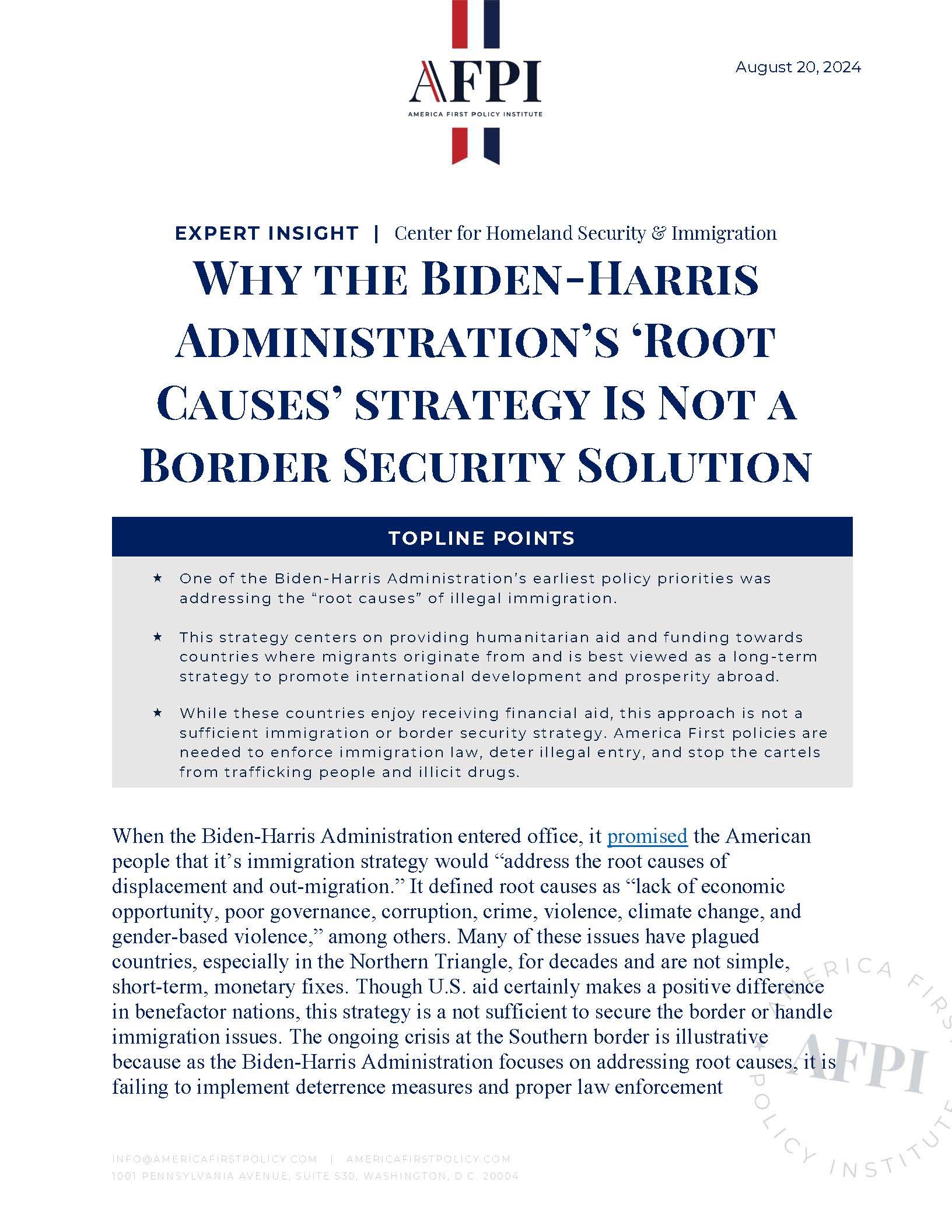Why the Biden-Harris Administration’s ‘Root Causes’ strategy Is Not a Border Security Solution
Key Takeaways
One of the Biden-Harris Administration’s earliest policy priorities was addressing the “root causes” of illegal immigration.
This strategy centers on providing humanitarian aid and funding towards countries where migrants originate from and is best viewed as a long-term strategy to promote international development and prosperity abroad.
While these countries enjoy receiving financial aid, this approach is not a sufficient immigration or border security strategy. America First policies are needed to enforce immigration law, deter illegal entry, and stop the cartels from trafficking people and illicit drugs.
When the Biden-Harris Administration entered office, it promised the American people that it’s immigration strategy would “address the root causes of displacement and out-migration.” It defined root causes as “lack of economic opportunity, poor governance, corruption, crime, violence, climate change, and gender-based violence,” among others. Many of these issues have plagued countries, especially in the Northern Triangle, for decades and are not simple, short-term, monetary fixes. Though U.S. aid certainly makes a positive difference in benefactor nations, this strategy is a not sufficient to secure the border or handle immigration issues. The ongoing crisis at the Southern border is illustrative because as the Biden-Harris Administration focuses on addressing root causes, it is failing to implement deterrence measures and proper law enforcement mechanisms. Below is an analysis of the top reasons the Biden-Harris Administration’s approach to root causes is not a successful strategy to solving the current border crisis:
Problematically, their strategy embraces the ‘throw money at the problem’ approach without proper conditions accompanying it. When the Biden-Harris Administration announced $4 billion in aid to the Northern Triangle countries to fix root causes, it actually pledged to provide that money to regional NGOs and civil society organizations over the course of time in office. For instance, this funding may support loans to a small business or help get an infrastructure project off the ground. This is an effective way to offer foreign aid, but it is not a strategy to stop immigration pull factors to the U.S. border. Working with other nations to fix their economy or prevent crime are long-term efforts. Unless countries are required to meet deliverables and demonstrate progress towards deterring migrants from taking the journey to the U.S., the money lacks accountability and the results will be insufficient.
As a consequence of primarily focusing on root causes at the expense of deterrence and immigration enforcement, there have been record-breaking numbers of apprehensions of illegal aliens at the U.S.-Mexico border throughout the Biden-Harris Administration. The strategy of processing and releasing illegal aliens who make it to the southern border creates tension with the stated objectives of the root causes strategy. In just one example, part of the 2021 root causes strategy includes efforts to “combat organized crime” in Central America. However, deliberate decisions by the Biden-Harris Administration to end border deterrence policies, re-instate catch and release, and exempt nearly all illegal aliens from deportation have only enriched organized crime (i.e. the Mexican drug cartels) like never before.
An effective strategy of providing foreign aid, especially to Central and South American countries, requires the recipients to make policy changes that were in the U.S. national interest. For example, to promote equal burden-sharing for asylum seekers in the region and cut down on exploitation of the asylum system in the U.S., the Trump Administration froze aid to El Salvador, Guatemala, and Honduras in 2019 over their facilitation of illegal aliens into the U.S. Not wanting to lose their respective aid packages, each country came to the table to negotiate the landmark Asylum Cooperative Agreements. The next America First administration should resume these negotiations after the Biden-Harris Administration terminated all of them.
In the past few years, the most significant 'root causes’ success story in the Northern Triangle has been El Salvador. With strong leadership and transformational policies of President Nayib Bukele, the country’s history of corruption and gang violence has been dramatically reversed. Citizens of El Salvador now enjoy public security, a better economy, and a government that has dedicated itself to investigating and rooting our corruption. As conditions have improved in El Salvador, the number of migrants leaving to the U.S. has steadily dropped in the past three years. The lesson here is that though foreign aid is important, it is one part of a larger solution to improve governance and promote freedom abroad. Strong political leadership with the courage to initiate reform and fight corruption in benefactor nations is crucial as well.
America First Solutions
To stop the flow of illegal aliens coming over our Southern border, we need America First policies that weaken the cartels, gang members, and other destabilizing forces that interfere with the possibility of healthy government and civil society abroad. This can be accomplished by making foreign aid contingent on meeting high standards of cooperation and ensuring maximum accountability for American tax dollars. But ultimately, the U.S. must prioritize policies that secure the southern border and impose consequences for those that cross unlawfully. This could include imposing harsher penalties for human smuggling, trafficking, and illicit drug laundering that occurs inside the U.S. After more than three years of the worst border crisis in American history, the American people deserve a robust strategy of short term and long-term policies that secure the border, end human trafficking, and defeat the cartels.
